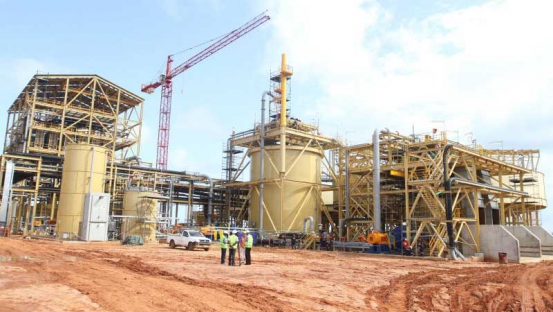Kwale: Kenya
International Commission of Jurists Kenyan chapter (ICJ Kenya) extended their good governance on extractives campaign to Kwale County. ICJ Kenya held a successful and interactive community dialogue forum on 30th June 2018 with the members of Kilole village in Kwale County. The aim of the community dialogue forum was to empower the community to actively and effectively participate and negotiate in the extractive processes. The ICJ-Kenya forum attracted members of the public and stakeholders from across the board to engage them on their views on extractives governance in Kwale.
The forum reflected on the fact that the members of Kilole village are unable to access information to foster meaningful engagement with duty bearers and Base Titanium Company which is undertaking the mining project in Kwale. The lack of access to information deprives the community of their rights to fully benefit from the ongoing extractive activities. The forum was held on 30th June at Kilole social hall in Kilole village, Kwale County.
The objectives of the convening were among other things, to mainstream principles of public participation in the community and empower the community to effectively participate and negotiate in the extractive processes. The participants were the members of the community from Kilole Village. The decision to go to Kilole village was informed by the fact that Base Titanium has secured a licence to expand exploration of minerals in Kwale County. This licence has allowed them to explore an expanded area surrounding its initial mining zone. The villages to be affected by the new exploration are Kilole, Magaoni, Zigira and Mwaka amongst others.
ICJ Kenya’s Governance Program Officer Cecilia Mugo, noted that there have been claims that Base Titanium often violates rights of the communities living in proximity to the mines. Particularly, allegations in the region are that residents of Maumba and Nguluku were poorly compensated and represented by the government. Furthermore, she noted that there have also been claims that titanium mining host communities in Kwale County are experiencing dire socio-economic conditions despite the mining project minting billions from titanium exploitation in their backyards. She urged the participants to be active during the forum and not to be afraid of expressing their concerns with regards to the mining of titanium in Kwale because ICJ Kenya is non-partisan and one of its mandates is to protect human rights.
Speaking during the forum, business and human rights expert Joe Kibugu began by stating that the problem that exists is power imbalance. He expounded this to mean that mining companies have economic power, the government has political power and communities only have the power of persuasion which is usually not enough. However, he stated that if the mining companies seek for consent from the communities it will address the power imbalance.
He urged the community to form a community association which has a focal person in each of the villages for purposes of negotiation on behalf of the community with the company. This would assist them to have structured dialogue with the Base Titanium. Furthermore, he told them that women and youth should be represented in these associations.
This is because at the community-level the aspect of free, prior and informed consent may not be considered, let alone at the household level. In certain incidents this is due to customs and traditions that dictate that the husband has the final say on any matter. He informed them that failure to involve women in the consultation process may lead to displacement without due consideration to a woman’s role in meeting the subsistence needs of her family. He further noted that payment of compensation and royalties is often directed to men “on behalf of” their families. This may deny women access to and control over the financial benefits of an extractive project, thus disempowering them or exacerbating existing inequalities.
Additionally, he pointed out that women-headed households may not receive payments if they do not have a male representative. This is because, often, women are solely responsible for subsistence activities and providing food for their families, and the effects of environmental damage and degradation can undermine their capacity to provide adequate food and clean water. Hence, this can subsequently lead to an increase in their workload such as having to walk greater distances to access water, fuel/wood, forest products and land to plant food crops.
Secondly, he urged them to document all negotiations that they have both with government and Base Titanium. Furthermore, he also stated that they should ensure that the government official or company official that convenes the meetings signs the documentation mentioned above. Particularly, he stated that when they meet with government officials such as the local chiefs this documentation is important so that they don’t do or say anything contrary to what was agreed in the meeting this is because leaders should be representative of the views of the people. Thirdly, he stressed the importance of being united because it will be hard to form an association if they are divided.
The participants made the following comments:
- It is very important for them to know what their rights are because they don’t want to relocate from their indigenous land due to the fact that the graves of generations that died before them are in those parcels of land.
- The community in the affected villages had formed an association that did not help because the most vocal members of the association were paid off by Base Titanium.
- Some villages in Kwale County are in agreement with Base Titanium
- Base Titanium has played a role in dividing the community in Kwale County.
- Politicians are the main reason that the community in Kwale County is currently divided.
- The members of the community in the area of Vungu where Base Titanium is located have not benefited at all from mining activities, they were displaced and are still jobless hence the reason why the members of Kilole village are against the idea of being displaced.
- Many government officials and other civil society organisations go to Kwale to have meetings with the members of the community in Kwale County but end up not helping them because they have their own agenda.
- The government never tries to get the consent of the community when acquiring land, they take the land by force.
- The community is very interested in knowing how to say no to displacement
Way Forward
- The members of the villages to be affected by the new exploration i.e. Kilole, Magaoni, Zigira and Mwaka should:
- Form an association for the purposes of having structured dialogue with Base Titanium and government officials.
- Make sure they document all agreements they make in meetings with government and Base Titanium.
- ICJ Kenya will have another forum in Kwale County with the members of Kilole, Magaoni, Zigira and Mwaka villages in order to train them on their rights so that they can be equipped with the requisite skills that will enable them to negotiate effectively in the extractives process.
For more information Contact: Moses Okinyi on moses.okinyi@icj-kenya.org / 0726989713











